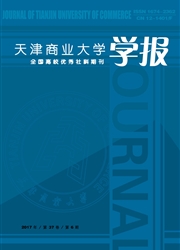

 中文摘要:
中文摘要:
基于2007—2014年我国三次产业上市公司数据,从全要素生产率视角来研究金融错配,试图找出金融错配与全要素生产率间的数量关系,为金融错配如何影响经济增长提供新思路。对于不同行业来说,金融错配能促进某些行业全要素生产率的提升,但对其他行业全要素生产率的提升又具有抑制作用。在样本期间内,金融错配与制造业、信息技术和房地产行业的全要素生产率呈现明显的负相关关系,说明制造业、信息技术和房地产行业对金融资源的依赖性比较大,对金融资源的使用成本比较敏感,从而金融错配引致资金成本上升不利于行业的发展和经济增长。
 英文摘要:
英文摘要:
This article is to study financial mispairing from the perspective of total factor productivity(TFP) based on the dataof listed companies of three industries from 2007 to 2014 in China, trying to find out the quantitative relationship betweenfinancial mispairing and TFP to give new ideas on how financial mispairing affects economic growth. For different industries,financial mispairing can promote the growth of TFP, or hinder the improvement of TFP. In the sample period, there is theobvious negative correlation between financial mispairing and TFP of manufacturing, information technology and real estateindustries, indicating that the industries depend largely on financial resources and are more sensitive to the cost of capital,so the rising cost of capital caused by financial mispairing is adverse to industrial development and economic growth.
 同期刊论文项目
同期刊论文项目
 同项目期刊论文
同项目期刊论文
 期刊信息
期刊信息
